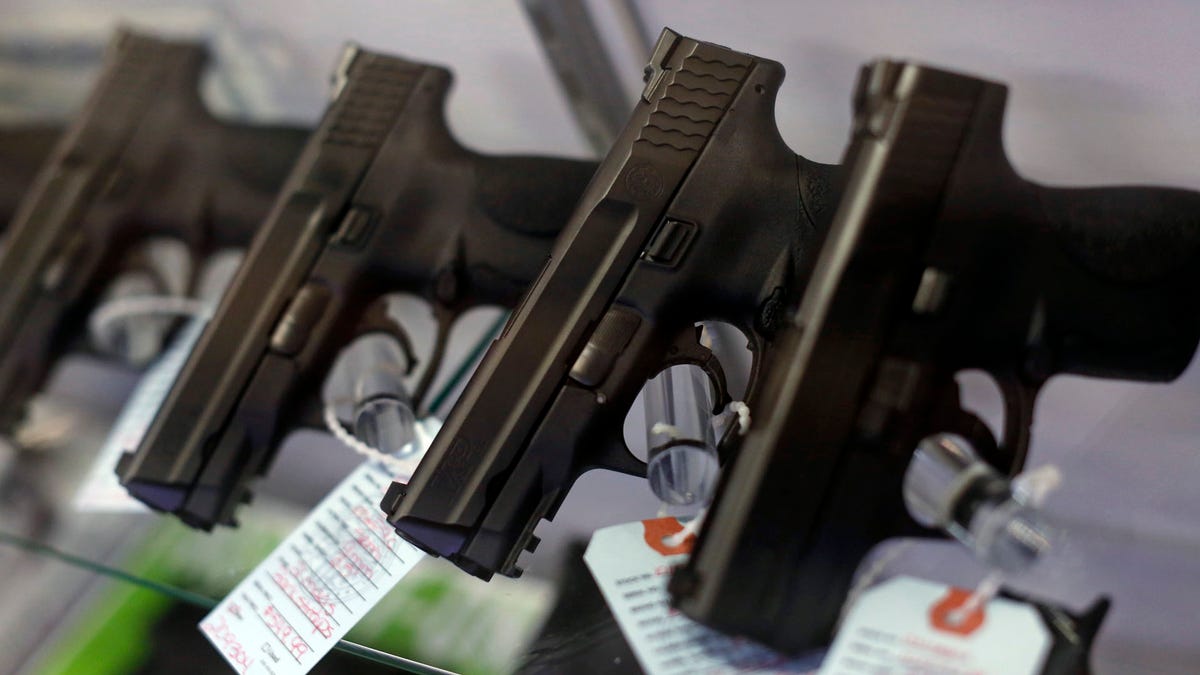
FILE -- Handguns are seen for sale in a display case. (REUTERS/Jim Young)
The enactment of bipartisan, common-sense laws to reduce the number of needless deaths caused by gun violence in our country is no longer a far-fetched idea.
A bipartisan group of senators – five Democrats and four Republicans – recently introduced a bill to improve background checks and increase accountability on gun sales.
This comes after a devastating year filled with several tragic and horrifying mass shootings. It is perhaps suggestive that the tide may be shifting on the importance of enacting measures to prevent gun violence.
Crafted primarily by Sen. John Cornyn, R-Texas, and Chris Murphy, D-Conn., the legislation would make background checks for gun buyers more thorough and precise by enforcing measures that strengthen the existing National Instant Criminal Background Check System (NICS).
Recent statewide elections signal a shift in public sentiment towards the issue of gun reform. In multiple elections around the nation this year, the issue of guns and the prevention of gun violence helped Democratic candidates.
Strengthening the NICS would help ensure that all required background check information critical to the determination of whether an individual should be able to buy a gun is uploaded and verified by states and federal agencies.
In order to ensure that states adhere to the uploading requirements, which the federal government technically cannot force states to do, the bill would create incentives for states to do so, such as by providing grants.
Cornyn said in a statement: “Just one record that’s not properly reported can lead to tragedy, as the country saw earlier this month in Sutherland Springs, Texas. This bill aims to help fix what’s become a nationwide, systemic problem so we can better prevent criminals and domestic abusers from obtaining firearms.”
Recent statewide elections signal a shift in public sentiment towards the issue of gun reform. In multiple elections around the nation this year, the issue of guns and the prevention of gun violence helped Democratic candidates.
Moreover, National Rife Association endorsements ended up hurting rather than helping Republican incumbents and frontrunners in critical races. This is a dramatic change from the past several decades, when gun issues and an endorsement from the NRA have been hugely beneficial to Republican candidates.
Possibly the most telling example of this shift in public sentiment is the Virginia gubernatorial election earlier this month, in which Democrat Ralph Northam beat Republican Ed Gillespie.
Following the election, I conducted a poll with 600 voters in Virginia with Everytown for Gun Safety on the role that gun-related issues played in the campaign. Our polling found that gun issues played a notably significant role in voters’ decisions.
In fact, 19 percent of voters in the election for governor said gun issues were the most important issues when they decided who they would vote for, trailing only jobs and the economy (37 percent) and health care (34 percent), while tying education (19 percent).
The results of our polling also signaled a notable trend: that the NRA’s endorsement hurt Gillespie, in addition to a number of other Republican candidates, instead of helping them.
In fact, 48 percent of voters said that the fact that Ed Gillespie was endorsed by the NRA and had an “A” rating from the group on gun-related issues made them less inclined to support him, compared to only 23 percent who said this made them more likely to support him.
What is incredibly telling in terms of the shift of national sentiment on gun-related issues and the NRA is that Gillespie’s NRA endorsement also hurt his candidacy among key groups that have historically supported the NRA.
These groups include: gun owners and gun-owning households (39 percent less likely to vote for an NRA-supported candidate, versus 32 percent more likely); white voters (39 percent less likely, versus 31 percent more likely); and male voters (35 percent less likely, versus 26 percent more likely).
Arguably the most important and noteworthy finding of our polling was that the more voters learned about the candidates’ gun positions, the more they supported Northam.
Ultimately, the NRA’s shrinking influence over the electorate helped a number of Democratic candidates and campaigns win statewide elections that normally would have been won by Republicans.
And these negative outcomes for the NRA are part of a larger trend that we have observed since 2010.
Indeed, the reality versus the myth of the NRA’s power was the subject of a report I produced with Ken Lerer in the spring of 2013 following the shootings at Sandy Hook Elementary School, titled “The Myth of NRA Power: What the NRA Really Means in American Politics Today.”
We found that the NRA wielded a considerably less substantial degree of influence in elections, with a substantially smaller financial role, than most people believed.
Based upon the election results from earlier this month in conjunction with the most recent bipartisan effort to enact gun-reform legislation, it is clear that the American people want to put an end to gun violence, and want to see their elected officials work towards enacting common-sense gun laws.
Referring to the bill introduced in the Senate, Sen. Murphy said it will “strengthen the background check system and save lives.” He added that the legislation “marks an important milestone that shows real compromise can be made on the issue of guns."
The fate of this legislation will be incredibly telling in terms of the progression of gun reform over the next several years, and certainly of the 2018 midterm elections.








































